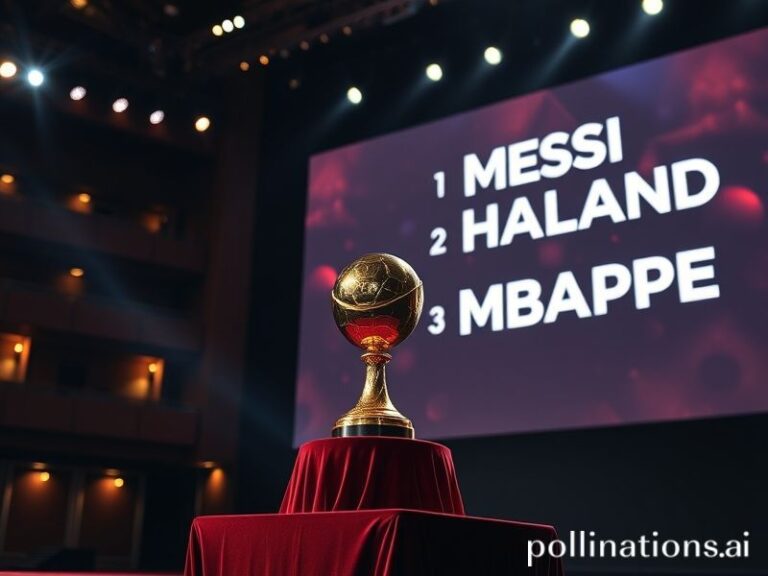Emelec vs Barcelona SC: The Ecuadorian Derby the World Secretly Needs
Guayaquil, Ecuador – In a city where the air tastes of diesel and ambition, two football clubs whose combined trophy cabinets could prop up the national debt will meet on Sunday night to decide whether Barcelona Sporting Club or Club Sport Emelec get to keep the bragging rights until civilisation collapses or the next derby, whichever comes first.
To the untrained eye, Emelec-Barcelona SC is just another South American clasico: ninety minutes of artisanal fouls, melodramatic dives, and stadium acoustics that would shame a Boeing 747. To the rest of the planet, however, the fixture is a convenient microcosm of everything that keeps the lights on in the global attention economy— tribal identity, weaponised nostalgia, and the faint hope that somewhere in the chaos a ball might accidentally cross a white line.
Let us zoom out. While Europe’s super-clubs busy themselves laundering oligarch reputations and trademarking the concept of Tuesday, Ecuador’s two giants continue their slow, stubborn resistance against football’s gentrification. Barcelona SC, founded by a homesick Catalan immigrant in 1925, still play in a stadium that looks like a brutalist parking garage cosplaying as a coliseum. Emelec, the electric-company team once bankrolled by actual kilowatts, have not updated their crest since the era when “Made in the USA” meant something other than crippling student debt. The match is thus a rare living fossil: derby as class warfare, played out on a patch of grass that neither Jeff Bezos nor the Saudi PIF have figured out how to monetise—yet.
Globally, the implications are almost beautiful in their futility. Every satellite feed that beams this game to an expat bar in Madrid or a betting app in Manila is a tiny act of rebellion against the homogenised Champions League product. Each illegal stream watched on a cracked phone screen in Lagos is a middle finger to the paywall empires. Somewhere in the Arctic, a polar bear drifts by on a melting ice sheet while a researcher live-tweets the score—proof that even at the edge of ecological apocalypse, humans will still argue about a penalty decision in the 73rd minute.
The geopolitical subplot is equally delicious. Ecuador’s government, currently juggling IMF austerity and Chinese lithium loans, has politely requested that fans refrain from burning down the city afterwards. The request has been filed next to the other sensible suggestions— world peace, a stable Twitter replacement, honest FIFA accounting. Meanwhile, the barrios of Guayaquil arm themselves with the usual pre-match essentials: face paint, flares, and the kind of industrial-grade fireworks banned on most continents. Local hospitals have stocked extra sutures; Uber has instituted a 300% surge for anyone suicidal enough to drive near the stadium.
And yet, for all the cynicism, there remains a stubborn purity here. No NFT ticketing, no half-time cryptocurrency giveaways, no club-branded metaverse where your avatar can purchase digital popcorn. Just 40,000 humans screaming themselves hoarse because a century ago someone decided that wearing yellow or blue was a perfectly reasonable hill to die on. The players, mostly kids too young to remember when the world made sense, will sprint until their lungs bleed, propelled by the quaint belief that tomorrow’s headlines might actually spell their names correctly.
Final whistle, fireworks, riots, rinse, repeat. The result will change nothing and everything: another three points toward a league title that won’t shift the price of bread, another generation scarred or baptised in the same stadium rituals their grandparents perfected under military juntas. Somewhere in the stands, a ten-year-old will cry tears of either joy or devastation; twenty years later he will drag his own child to the same concrete terraces, perpetuating the most honest pyramid scheme humanity has ever devised.
So tune in, dear cosmopolitan reader, secure in the knowledge that while the planet debates carbon credits and AI regulation, a corner of South America will spend ninety minutes proving that tribal absurdity is the last renewable resource we have left. And if the feed cuts out, just imagine the noise— a sound somewhere between hope and a controlled explosion— echoing across a city that stubbornly refuses to love anything in moderation.







